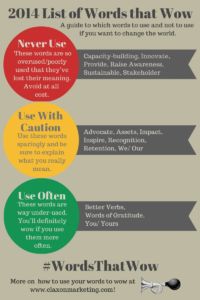 [This is the latest installment in our #WordsThatWow series. You can read the others here and you can download the infographic here.]
[This is the latest installment in our #WordsThatWow series. You can read the others here and you can download the infographic here.]
Your supporters like to be recognized and all nonprofits need assets. So why, you might wonder, did the words ‘recognition’ and ‘assets’ end up on the Use With Caution section of the 2014 List of Words that Wow?
They ended up there because nonprofits are generally doing a lousy job of using them to their full potential. They’ve been de-humanized.
- Recognition: When you think about recognition, you want to think about it not just as acknowledgment but as “appreciation of the value of an achievement”. You shouldn’t merely recognize your supporters for their contributions of time, treasure and talent–you should be showering them with love and gratitude! It’s like the auto-magically generated super boring thank you letters that most organizations send out–it goes out, you check off the box, and then move on to the next thing because you’ve technically thanked them. Not cool, people, not cool. There’s no reason for those letters to be boring. What would it look like to truly, fully recognize your donors, volunteers, advocates, fans and supporters for the value of their achievement? Do that.
- Assets: When you say ‘assets’, what are you really saying? An asset is “something or somebody of value”. When you refer to ‘organizational assets’, you might be referring to dollars in the bank, or computers, or a coffee machine, or some other inanimate object. But sometimes, we’re talking about animate objects, i.e. people. If you’re referring to people–staff, board, volunteers, etc–say ‘people’. Referring to people as assets creates distance, it’s sterile, cold. Unless you want a cold, sterile relationship with the people who are working hard to advance your mission, stop referring to them ‘assets’. It’s just kind of weird.
In sum: Less recognition of assets. More showering people with gratitude.